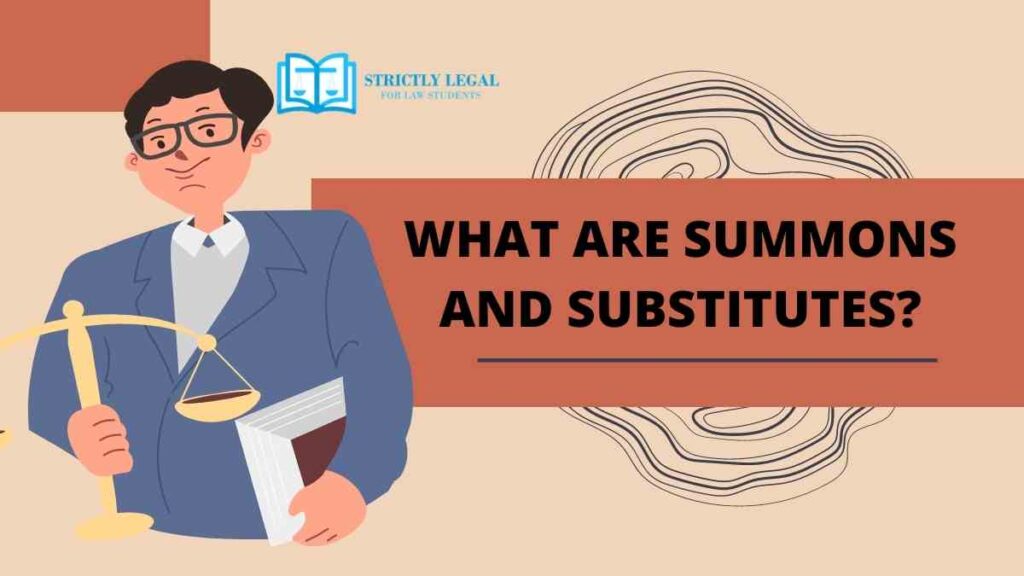By a preliminary idea, a summon can be defined as it is issued by the Court of Law for the appearance of the accused, any party, or witness or the presentation of any legal document. In short, it is a clear, crisp, and very particular document and also contains the time and date of appearance in the Court. The person to whom the summon is served has to appear before the court on the designated date and time. There is no limitation that summons are served to civil cases only, they can be served in a criminal case as well. Whereas, on the other hand, substitutes are only based on civil cases.
Table of Contents
Understanding the term “Summon”
The very general and common meaning of summoning is to order or ask a specific person to be present in person at the Court. It is the simplest form of a legal process that is issued by the Court for enforcing the attendance of persons or any document at the specified time and date that is provided in the document. The court may give the summon to a person or any document.
The main objective of such a legal document (summon) is to inform the defendant or the respondent that the plaintiff/ petitioner in the case has filed a legal suit against him, may it be criminal or civil. A copy of the complaint filed by the plaintiff is also attached herewith to the summon. In the case where the designated person named in the summon may not appear in person at the Court for certain unavoidable reasons, his/her advocate may appear in the court who is well versed with the respondent/ defendant’s side of the facts.
Understanding the term “Substitute”
Substitution is where one party in action is replaced by another. The reason for such a substitution might be anything I.e., death of anyone from the previous party, incompetence, removal or termination of someone for being prosecuted in his official capacity, and many as such.
Types of Summons
There are mainly three types of Summons that are known. They are as follows:
Civil Summon:
These are the legal summons which is given to the specific person in terms of a civil case, to appear in the court and respond to the plaint provided by the plaintiff. It is also given as a medium of information to the defendant that a civil suit has been formulated against him.
Generally a civil summon is initiated in cases of damages, compensation, or the loss or damage that occurred by the plaintiff for the defendant.
Criminal Summons:
These are the legal summons that is served to the specific person in terms of a criminal case, to appear in the court and respond to the plaint provided by the plaintiff. In a criminal case, a summon can be of a different type than is served. Such as a notice to appear in the court, traffic summons, to present any specific document in the court, etc. In minor cases, a police officer also holds the right to provide a summons.
Administrative Summons:
These are the legal documents that are sent by the administrative body of the country which is authorized by law, like summons by the tax authority, summons under arbitration, etc. Such summons is only served by the administrative courts like Labour Courts, Tax Courts, etc., as such courts have the power to summon a person under the jurisdiction of that court.
How Summons are served?
The service of the summons is described under Section 62 of the Code of Criminal Procedure, 1973 [herein after referred to as the Act]. It shall be served by a police officer, by an officer of the court, or by any public servant.
If the person to whom the summons is to be given, is not found at his residing place, then, the summons shall be served by providing the duplicate copy to any adult male member of his family who resides with him, and the signature of the same person will be taken to the original summon under section 64 of the Act. Any servant or any domestic help who works in the family is not considered a member of the family within the ambit of this section.
In the case where a person summoned cannot be found at his designated place and Section 64 of the Act refrains from serving, the concerned serving officer shall attach the duplicate copy of the summon on the conspicuous place of the house of the person who is summoned I.e., where he ordinarily resided. After attaching the copy, the concerned officer will report to the court and it shall be declared by the Honorable Court of Law that the summons has duly been served.
Service of Summons that are substituted
Where the Honorable Court of Law is satisfied that-
- The defendant/ respondent deliberately avoids the service,
- The reason that summons cannot be served in ordinary ways.
The Court of Law shall allow performing the service of summoning by attaching the copy in the conspicuous place in the court, and the house of a person.
- Where the person to whom the summons are to be served, is in prison, the summon shall be served to the officer IN charge of the person.
- Where the person to whom the summons are to be served, resides abroad and has got no agent in India, the summon shall be sent to the designated person via post where he is residing provided there is a postal mode of communication between India and the concerned country where the summoned person resides.
- Where the person to whom the summons are to be served, is a Public Officer, the summons shall be served to the head of the office, in which the summoned person is employed.
- Where the person to whom the summons are to be served, belongs to the Indian Army or is an Airman, Soldier or in the Navy, the summons shall be served to his commanding officer with a copy of the summons.

Law student.
Turning legal insights into engaging narratives.





